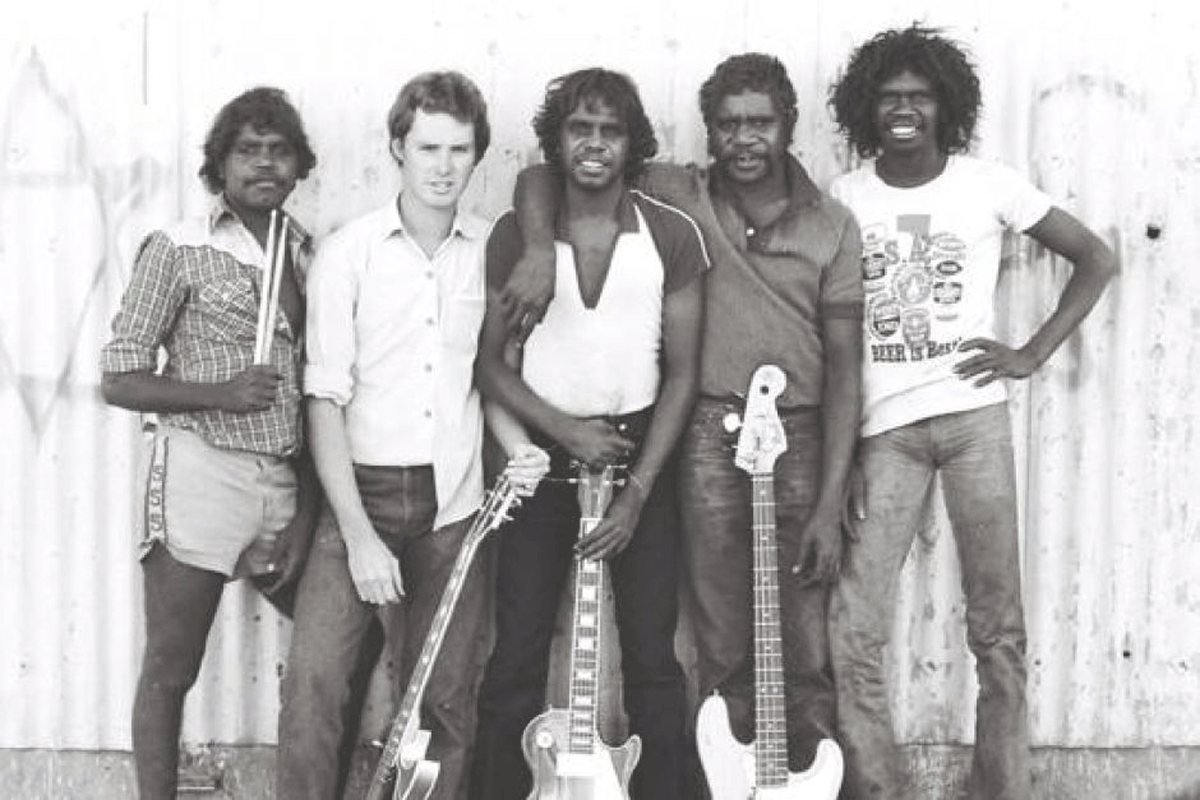A very famous song from a brilliant group. Sometimes it is forgotten that the Warumpis wrote the ‘alternative’ Australian Anthem “My Island Home”, although it is actually about Elcho, a small island in Arnhem Land, Australia.
The Warumpi Band were formed in 1980 in Papunya – an outback settlement about 240 kilometres (150 mi) north-west of Alice Springs in the Northern Territory – as a country and Aboriginal rock group. Neil Murray was a Victorian-born schoolteacher and labourer who was working in the region. He met local brothers Gordon Butcher Tjapanangka and Sammy Butcher Tjapanangkaof the Luritja people; and were joined by Sammy’s brother-in-law George Rrurrambu Burarrwanga (aka George Djilangya), visiting from Elcho Island’s Yolngu people. Murray provided rhythm guitar and backing vocals, Gordon was on drums, Sammy on guitar and bass guitar, and Burarrwanga on vocals and didgeridoo. ‘Warumpi’ derives from the Luritja word for a “honey-ant dreaming site”, which lies near Papunya. Over the years, many different people played in the band at various times. The only consistent elements were Murray and Burarrwanga, with Sammy Butcher generally being available when band commitments did not take him too far from home for long.
The group began by playing cover versions of rock ‘n’ roll standards and toured the Northern Territory and the Kimberley region of northern Western Australia. In 1983 at the Aboriginal Country Music Festival they were voted as best band and by that stage they were playing more original material. In October that year they released their debut single, “Jailanguru Pakarnu” (Luritja for Out from Jail) on the Hot label. It is the first song released in a rock music format which uses an Aboriginal language, Luritja. For the single they were joined by another Butcher brother, Brian, on bass guitar. The track created mainstream media interest, and the group travelled to the interstate capitals of Melbourne and Sydney for gigs and TV appearances.
Warumpi Band built up a loyal following in Sydney’s northern beaches pub rock scene, and played as a support act to Midnight Oil. In 1985 the band signed with Midnight Oil’s Powderworks label and released their debut album, Big Name, No Blankets in April. Australian rock music historian, Ian McFarlane, felt although “grounded in early American R&B and boogie as it was, the album was nevertheless an honest, enduring and bare-boned slice of indigenous country music”. Big Name, No Blankets featured the single, “Blackfella/Whitefella”, which appeared in October. The group undertook a national tour as well as playing in Papua New Guinea, Solomon Islands and Vanuatu.
In 1986, Midnight Oil and Warumpi Band embarked on the Blackfella/Whitefella Tour which reached some of the country’s remotest locations. In July, while on tour, “Blackfella/Whitefella” was re-released as a track on the B-side of Midnight Oil’s 12″ shared single, “The Dead Heart”, and included tour mate Coloured Stone’s track “This Land”. After the tour the Butcher brothers left and the group signed with Festival Records’ imprint Parole Records. In October and November Burarrwanga and Murray were joined by Kenny Smith on bass guitar and backing vocals, and American-born Allen Murphy on drums to record their second album, Go Bush!.

